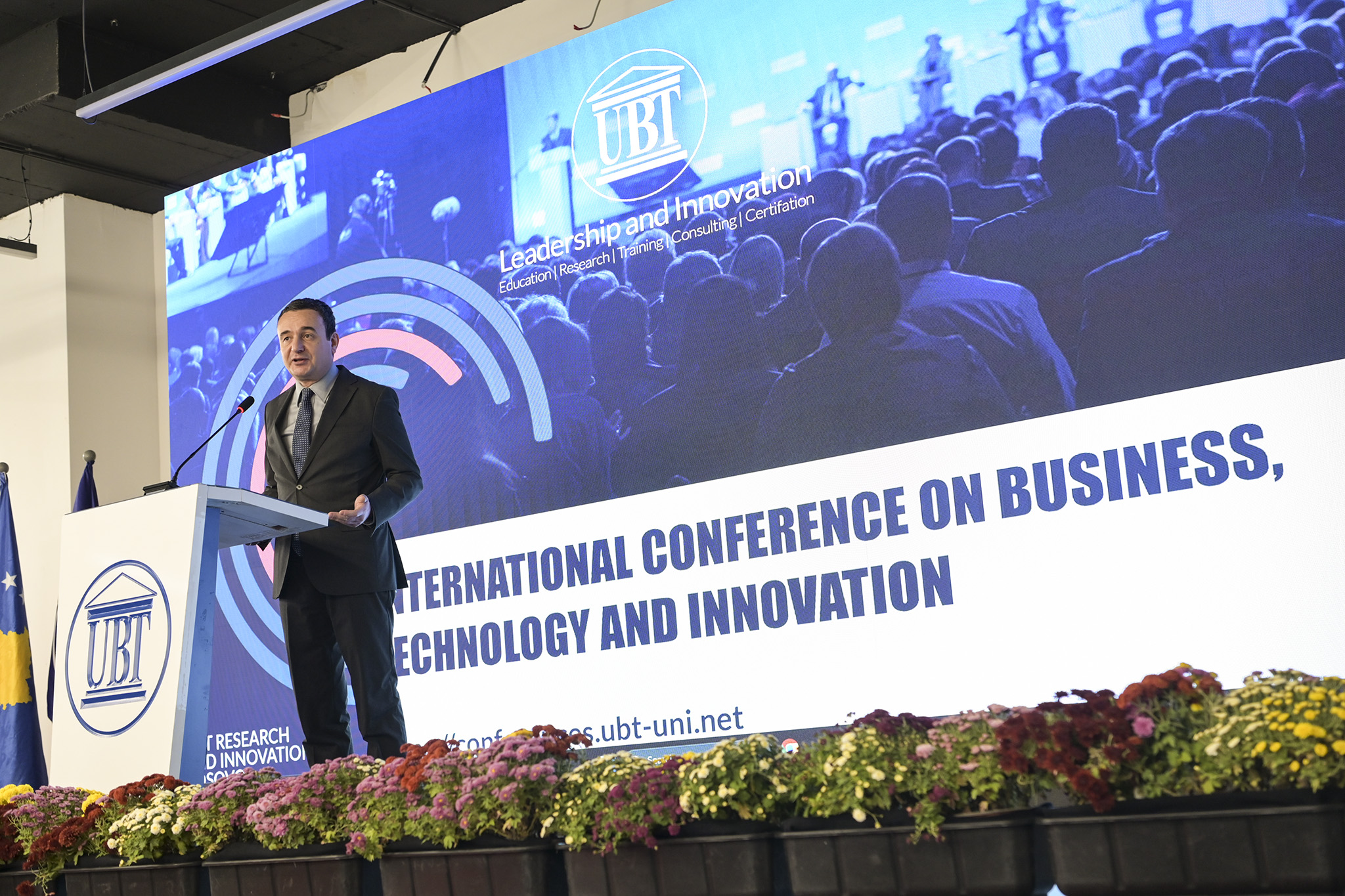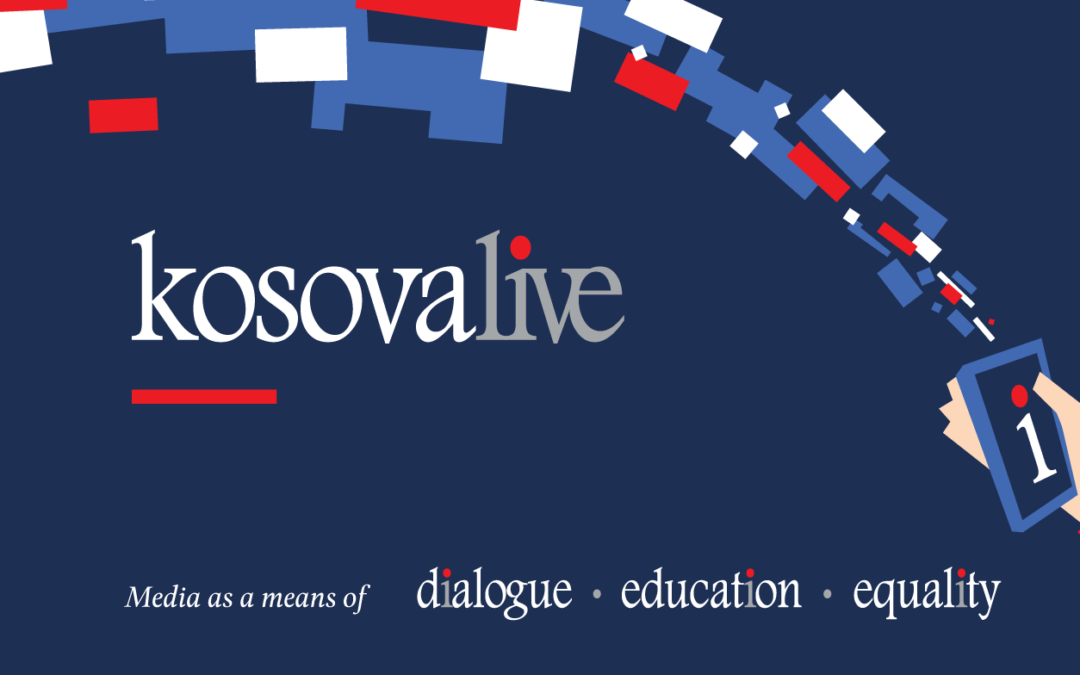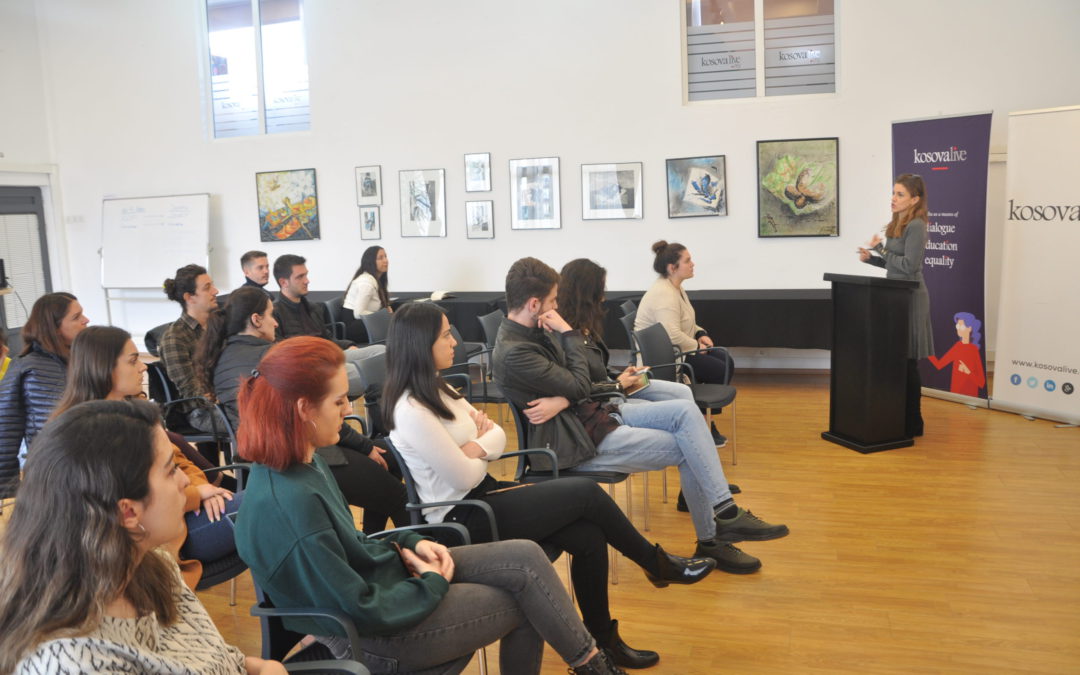Kryeministri i Republikë së Kosovës, Albin Kurti, mori pjesë sot në konferencën me temë “Lidershipi në kohë sfiduese”, të organizuar nga kolegji UBT.
Në fjalën e tij, si njëri nga folësit kryesor, ai foli për cilësitë fundamentale të liderit që e definojnë një lider të mirë dhe të madh.
Dy cilësitë kryesore të një lideri të mirë, sipas kryeministrit, janë efektiviteti pragmatik për të tërhequr dhe mirëmbajtur ndjekës ose mbështetës, dhe përkushtimi parimor ndaj një kauze të drejtë, sepse pragmatizmi pa parime është bosh, kurse parimi pa pragmatizëm është i pafrytshëm. Ndërkaq, duke folur për cilësitë që e përcaktojnë një lider të madh, ai tha se ata definohen nga vullneti për të sakrifikuar interesin e tyre për një kauzë më të madhe. Pra, liderët e mëdhenj janë aq të dedikuar ndaj parimeve të tyre dhe aq të vendosur për t’i mbrojtur ato në mënyrën më të mirë, sa që janë të gatshëm të sakrifikojnë interesin e tyre personal.
Si shembull të një lideri të mirë dhe të madh, kryeministri Kurti në fjalën e tij, veçoi presidentin e 16-të të Shteteve të Bashkuara të Amerikës, Abraham Lincoln.
Ai gjithashtu foli edhe për punën dhe kontributin e Qeverisë në nxitjen dhe përgatitjen e liderëve të së ardhmes të cilët janë efektiv në mënyrë pragmatike dhe moralisht parimor, thuhet në komunikatën për media e ZKM-së.
What makes a good leader? This short, five-word question seems simple on its surface. But that superficial simplicity masks the deep theoretical complexity and practical importance of the topic at hand. Since we’re in a university setting, we shouldn’t attempt to hide that complexity. Rather, we should embrace it. So I won’t try to give a conclusive answer to the question I have posed. I will instead offer some personal reflections on the topic, drawing on insights from the fields of philosophy and history. I will then close by talking about what our Government is doing to help our citizens — especially our young people — become even better leaders in the future, across a variety of fields.
The complexity of what makes a good leader stems in part from an ambiguity in the very concept of goodness. On the one hand, goodness can refer simply to effectiveness in achieving certain defined aims. So, for example, a good knife is one that can cut things effectively; a good watch is one that tells time accurately; and so on. But on the other hand, goodness can also refer to certain moral qualities, such as when we say that someone has a good character, or has performed a good act. This moral notion of goodness is conceptually distinct from the notion of goodness as effectiveness.
The concept of goodness is often applied not only to objects or personal qualities, but also to social roles. In the case of some of these roles, the two notions of goodness we identified above can clearly come apart. For example, a good spy is simply one that performs his or her intelligence-related tasks effectively. Whether the spy is a morally good person is a completely separate question. To answer it, we must evaluate the cause for which he or she works, as well as his or her motives for doing so.
But in the case of some other social roles, we cannot so easily separate effectiveness from mo
ral qualities in our evaluations. For instance, being a good father or a good friend is not just about being effective at performing certain tasks. It also requires having certain moral qualities of character. These qualities are associated with the ethical ideals of what it means to be a good parent or a good friend.
So, what about being a good leader? One might initially think that leadership falls under the first category: A good leader is simply one who is effective at attracting and maintaining a set of followers. In this view, in order to judge whether someone is a good leader, there’s no need to evaluate the moral goodness or badness of the aims he or she pursues, or the methods used to achieve them.
This, I think, is a mistake. Some of the most destructive figures of the twentieth century — Hitler, Stalin, Pinochet, Mao, Milosevic — were certainly effective at attracting and maintaining followers. Indeed, their effectiveness in this regard was as terrible as it was devastating. But it would be incorrect to call them good leaders, precisely because they were moral failures. Just like friendship and parenthood, good leadership is a fundamentally ethical ideal.
But what precisely does that ethical ideal consist in? Or, to go back to our original question: What makes a good leader? The ethical ideal of a good leader brings together two essential qualities: a pragmatic effectiveness at attracting and maintaining followers, combined with a principled commitment to a just cause. On this account, both qualities are essential to good leadership: Pragmatism without principle is empty; principle without pragmatism is fruitless.
This ethical ideal of leadership — the unity of pragmatism and principle — is perhaps best exemplified in American history by the 16th President of the United States, Abraham Lincoln. Lincoln is, of course, best known — and most beloved — for his Emancipation Proclamation, issued in the midst of the Civil War. That Proclamation officially declared an end to slavery in the rebellious states.
Lincoln was a lifelong personal opponent of slavery. He once wrote that “if slavery is not wrong, nothing is wrong.” So you may be surprised to learn that as a political matter, he stood firmly against the elimination of slavery at the beginning of the Civil War. He did this for clear pragmatic reasons: If Lincoln had called for the end of slavery so early on in the war, he would have immediately lost the support of the loyal slave states, which were essential for military success. He would also have lost the backing of the majority of American voters — even in the North, where racism was still widespread. In other words, taking a strong stand against slavery from the beginning would have made it impossible to win the war — for both military and political reasons.
Thus, Lincoln was exceedingly careful to cast the war not as a quest to end slavery, but as a battle to preserve the Union and defend democracy. In his Message to Congress on July 4, 1861, he highlighted that the purpose of the war was “to demonstrate to the world that those who can fairly carry an election can also suppress a rebellion; that when ballots have fairly and constitutionally decided, there can be no successful appeal back to bullets; there can be no successful appeal except to ballots themselves at succeeding elections. Such will be a great lesson of peace, teaching men that what they cannot take by an election, neither can they take it by a war.”
Even the Emancipation Proclamation — which was issued more than a year and a half after the war began — was not explicitly based on slavery’s wrongness or injustice. Instead, Lincoln argued that the Proclamation was a measure that was necessary for winning the war: Freeing the slaves would motivate them to fight for the North, and it would also prevent the South from exploiting the slaves to sustain its own war effort. Again, this legal reasoning was offered for primarily pragmatic reasons: Lincoln knew that if he tried to end slavery purely on the grounds of its injustice, he would cripple democratic support for the war. And the Supreme Court would likely have blocked his measure anyway: At that time, the practice of slavery still enjoyed explicit constitutional protection. Casting the Proclamation as a necessity of war was designed to overcome that obstacle.
All of this shows that Lincoln was a brilliantly effective
politician: He knew precisely how to attract and maintain enough democratic support to achieve his stated aims of preserving the Union and defending democracy. Calling for the end of slavery at the beginning of the war might have been morally satisfying. But paradoxically, it would have prolonged slavery’s existence indefinitely, by making the war impossible to win. Citing the wrongness of slavery as the legal basis for the Emancipation Proclamation would also have been satisfying. But doing so would have undermined both its legal justification and its political viability, thereby defeating the purpose of the Proclamation in the first place. The course that Lincoln took was — at least arguably — the most effective possible way to achieve his political aims. And that effectiveness was essential to his being a good leader. Without being effective at maintaining consistent political support for his cause, he would still have been a morally admirable person. But as a leader, he would have been a failure.
But as we have already noted, effectiveness is a necessary but not a sufficient condition for being a good leader. Lincoln’s example teaches us this as well. His embodiment of the ideal of leadership had a moral quality that went far beyond mere political effectiveness. Despite the purely instrumental grounds of the Emancipation Proclamation, Lincoln adamantly rejected the idea of returning the freed slaves back to servitude after they were no longer needed for the war. Thus, he wrote: “If [the slaves] stake their lives for us, they must be prompted by the strongest motive — even the promise of freedom. And the promise, being made, must be kept.” Lincoln kept his promise: In order to eliminate forever the possibility of re-enslavement after liberation, he lobbied heavily — and successfully — for the Thirteenth Amendment to the Constitution, which ended slavery in the United States, once and for all.
But imagine if Lincoln had not kept his promise. Imagine if he had sent the slaves back to their prior condition after they were no longer necessary for the achievement of his political aims. He would still have been a remarkably effective politicia
n — effective at maintaining the popular support necessary to keep fighting the war, and eventually to win it. But the re-enslavement would have been a moral disaster — and, I would argue, a failure of leadership. Once again, both qualities are essential in a good leader: pragmatic effectiveness and moral principle.
If a good leader is one who is both pragmatically effective and morally principled, what makes a great leader? One might be tempted to say that a great leader is one who is even more effective and even more principled than a simply good one. That is accurate enough, but we can say more. For the truth is more profound: What makes a leader great, I would argue, is the willingness to sacrifice his or her own interests for a greater cause. In other words, great leaders are so dedicated to their principles — and so determined to defend those principles in the most effective way possible — that they are willing to damage their personal interests in order to do so.
Lincoln’s greatness as a leader manifests itself in precisely this way. As the presidential election of 1864 approached, he was clearly on track to lose. Barely two months before the vote, the President himself wrote the following dispiriting message to his Cabinet: “This morning, as for some days past, it seems exceedingly probable that this Administration will not be re-elected.” Some of Lincoln’s political allies urged him to postpone the election — and to cite the ongoing Civil War as a pretext for doing so. But Lincoln refused, as a matter of principle: How could he claim to be fighting a war to defend democracy, if he was himself unwilling to submit to the judgment of the people? By refusing to use the war as a convenient excuse to delay the election — by being prepared to accept his own defeat at the ballot box — Lincoln showed just how deep was his commitment to democratic principles. Of course, we now know that Lincoln’s political fortunes changed quickly for the better. He was decisively re-elected on November 8, 1864 — the first time in world history that a national election was organized in the midst of a civil war.
What, then, is our Government doing to produce pragmatically effective and morally principled leaders in the future? First and foremost, we are striving every day to set an example of what principled leadership looks like in a free, democratic society. In our two-and-a-half years in office thus far, we have made internationally recognized progress in the areas of human rights, democracy, and rule of law. This year, Freedom House ranked Kosova as third in the entire world for year-on-year democratic progress. The World Justice Project has ranked Kosova first in the Western Balkans on rule of law, and second in the world for the greatest improvement in rule of law, over the course of 2022. In Transparency International’s Corruption Perception Index, we have improved 20 places in the past two years. We’ve also improved 22 places in Reporters without Borders’ Press Freedom Index. And we’re ranked first in the Western Balkans in the V-Dem Institute’s Electoral Democracy Index. The 2022 country report of the EU Commission confirms that Kosova has stepped up its efforts to fight corruption and strengthen democracy and rule of law. In other words, now more than ever, we are demonstrating that it is possible to lead the country both effectively and morally.
At the same time, we’re ensuring that Kosova’s remarkable economic success — with a record 7.9% average GDP growth over two years — is shared as widely as possible. In doing so, we are improving social solidarity and fostering a society-wide notion that we all have an obligation to care for — and to even sacrifice for — one another. For example, the World Bank has ranked Kosova first in the Western Balkans for the largest fiscal package (as a percentage of GDP) to help citizens cope with the recent food and energy crisis. 842 million Euros have been redistributed through these schemes, as well as in support packages to help citizens deal with inflation. We’ve also increased public-sector salaries and significantly reduced the gap between the highest and lowest salaries from a ratio of 20 to 1, to 4.78 to 1. We’ve introduced child-care subsidies for families with children up to 16 years of age. And thanks to our “Government for Families” employment program, nearly 1,500 additional families have at least one member with a job — 603 of them women. We’re showing that leadership is not about exploiting political power to hoard benefits for oneself. Rather, it’s about harnessing that power for the benefit of all citizens — especially those most in need.
Aside from serving as a moral example for citizens, our Government has also made significant investments in Kosova’s education system. We want to ensure that all young people have a fair opportunity to develop into effective leaders in their chosen fields — especially young women and other traditionally disadvantaged groups. Thanks to our efforts, public higher education in Kosova is free of charge for the first time ever. Furthermore, we’ve disbursed approximately 4,000 scholarships for students, including 2,900 in STEM fields. In Kosova, women already make up half of all STEM students, compared to 17% in the European Union. We’ve also disbursed 500 scholarships for pupils from the Roma, Ashkali, and Egyptian communities. And we’ve successfully inaugurated a dual-education system, with 12 curricular profiles in 21 schools across 13 municipalities.
These investments and initiatives are only a limited sample of all that we are doing today to produce the leaders of tomorrow. But this is also just the beginning. With our ongoing and constantly improving efforts in the areas mentioned above, I am confident that Kosova’s best days — and its best leaders — lie ahead of it.




